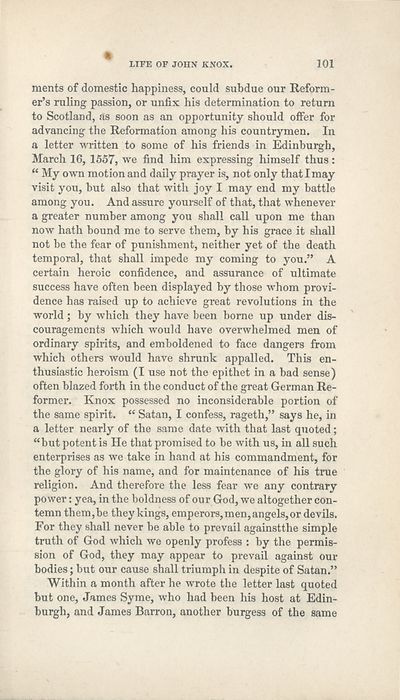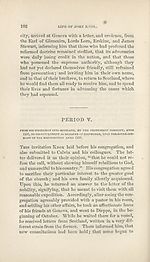Download files
Complete book:
Individual page:
Thumbnail gallery: Grid view | List view

LIFE OF JOHN KNOX.
101
ments of domestic happiness, could subdue our Reform¬
er’s ruling passion, or unfix his determination to return
to Scotland, as soon as an opportunity should offer for
advancing the Reformation among his countrymen. In
a letter written to some of his friends in Edinburgh,
March 16, 1557, we find him expressing himself thus:
“ My own motion and daily prayer is, not only that I may
visit you, but also that with joy I may end my battle
among you. And assure yourself of that, that whenever
a greater number among you shall call upon me than
now hath bound me to serve them, by his grace it shall
not be the fear of punishment, neither yet of the death
temporal, that shall impede my coming to you.” A
certain heroic confidence, and assurance of ultimate
success have often been displayed by those whom provi¬
dence has raised up to achieve great revolutions in the
world; by which they have been borne up under dis¬
couragements which would have overwhelmed men of
ordinary spirits, and emboldened to face dangers from
which others would have shrunk appalled. This en¬
thusiastic heroism (I use not the epithet in a bad sense)
often blazed forth in the conduct of the great German Re¬
former. Knox possessed no inconsiderable portion of
the same spirit. “ Satan, I confess, rageth,” says he, in
a letter nearly of the same date with that last quoted;
“but potent is He that promised to be with us, in all such
enterprises as we take in hand at his commandment, for
the glory of his name, and for maintenance of his true
religion. And therefore the less fear we any contrary
power: yea, in the boldness of our God, we altogether con¬
temn them,be they kings, emperors,men, angels, or devils.
For they shall never be able to prevail againstthe simple
truth of God which we openly profess : by the permis¬
sion of God, they may appear to prevail against our
bodies; but our cause shall triumph in despite of Satan.”
Within a month after he wrote the letter last quoted
but one, James Syme, who had been his host at Edin¬
burgh, and James Barron, another burgess of the same
101
ments of domestic happiness, could subdue our Reform¬
er’s ruling passion, or unfix his determination to return
to Scotland, as soon as an opportunity should offer for
advancing the Reformation among his countrymen. In
a letter written to some of his friends in Edinburgh,
March 16, 1557, we find him expressing himself thus:
“ My own motion and daily prayer is, not only that I may
visit you, but also that with joy I may end my battle
among you. And assure yourself of that, that whenever
a greater number among you shall call upon me than
now hath bound me to serve them, by his grace it shall
not be the fear of punishment, neither yet of the death
temporal, that shall impede my coming to you.” A
certain heroic confidence, and assurance of ultimate
success have often been displayed by those whom provi¬
dence has raised up to achieve great revolutions in the
world; by which they have been borne up under dis¬
couragements which would have overwhelmed men of
ordinary spirits, and emboldened to face dangers from
which others would have shrunk appalled. This en¬
thusiastic heroism (I use not the epithet in a bad sense)
often blazed forth in the conduct of the great German Re¬
former. Knox possessed no inconsiderable portion of
the same spirit. “ Satan, I confess, rageth,” says he, in
a letter nearly of the same date with that last quoted;
“but potent is He that promised to be with us, in all such
enterprises as we take in hand at his commandment, for
the glory of his name, and for maintenance of his true
religion. And therefore the less fear we any contrary
power: yea, in the boldness of our God, we altogether con¬
temn them,be they kings, emperors,men, angels, or devils.
For they shall never be able to prevail againstthe simple
truth of God which we openly profess : by the permis¬
sion of God, they may appear to prevail against our
bodies; but our cause shall triumph in despite of Satan.”
Within a month after he wrote the letter last quoted
but one, James Syme, who had been his host at Edin¬
burgh, and James Barron, another burgess of the same
Set display mode to:
![]() Universal Viewer |
Universal Viewer | ![]() Mirador |
Large image | Transcription
Mirador |
Large image | Transcription
| Antiquarian books of Scotland > Scotland/Scots > Life of John Knox ; and, The life of Alexander Henderson > (119) |
|---|
| Permanent URL | https://digital.nls.uk/131833732 |
|---|
| Description | Thousands of printed books from the Antiquarian Books of Scotland collection which dates from 1641 to the 1980s. The collection consists of 14,800 books which were published in Scotland or have a Scottish connection, e.g. through the author, printer or owner. Subjects covered include sport, education, diseases, adventure, occupations, Jacobites, politics and religion. Among the 29 languages represented are English, Gaelic, Italian, French, Russian and Swedish. |
|---|

